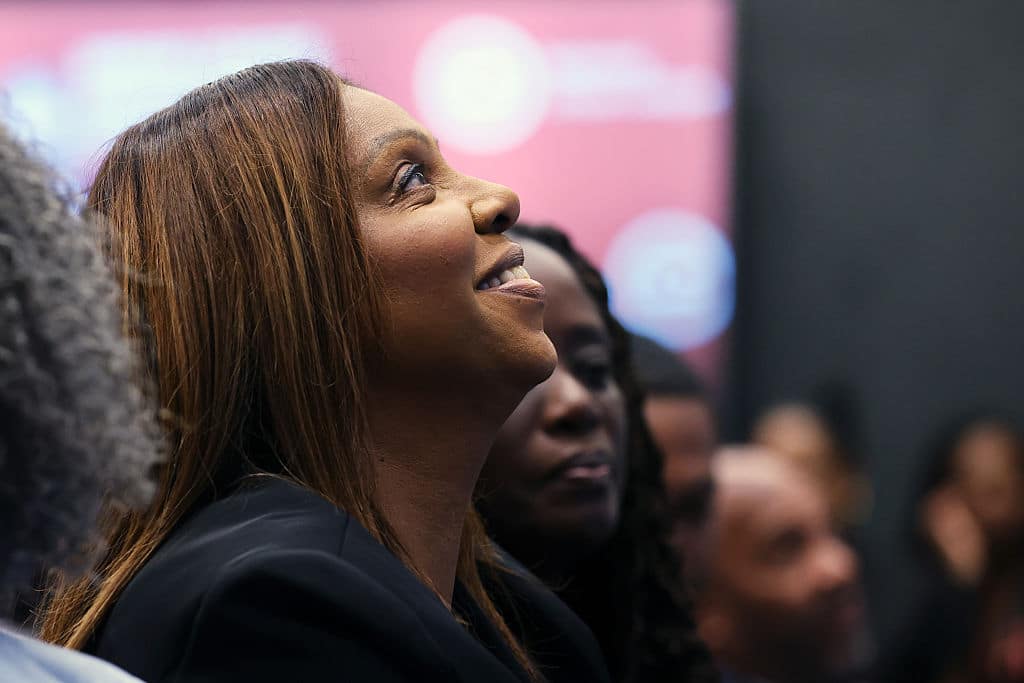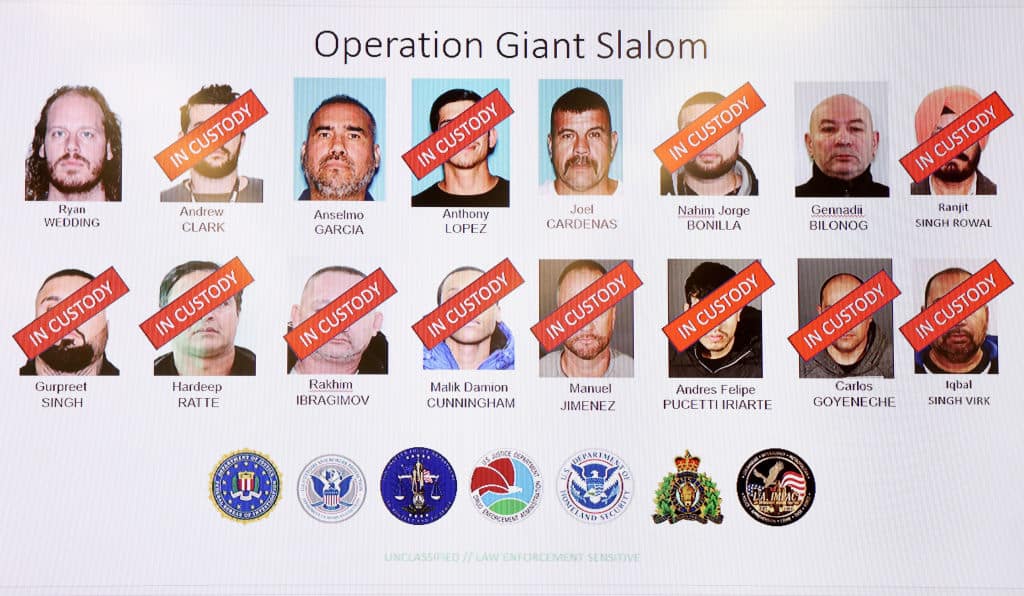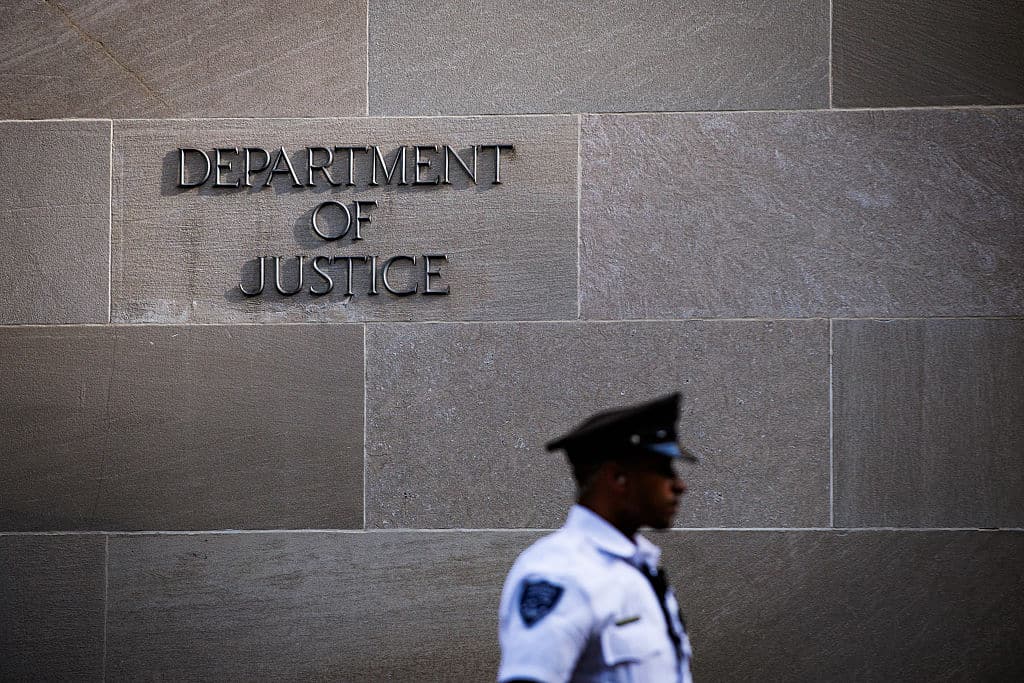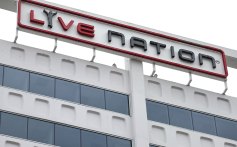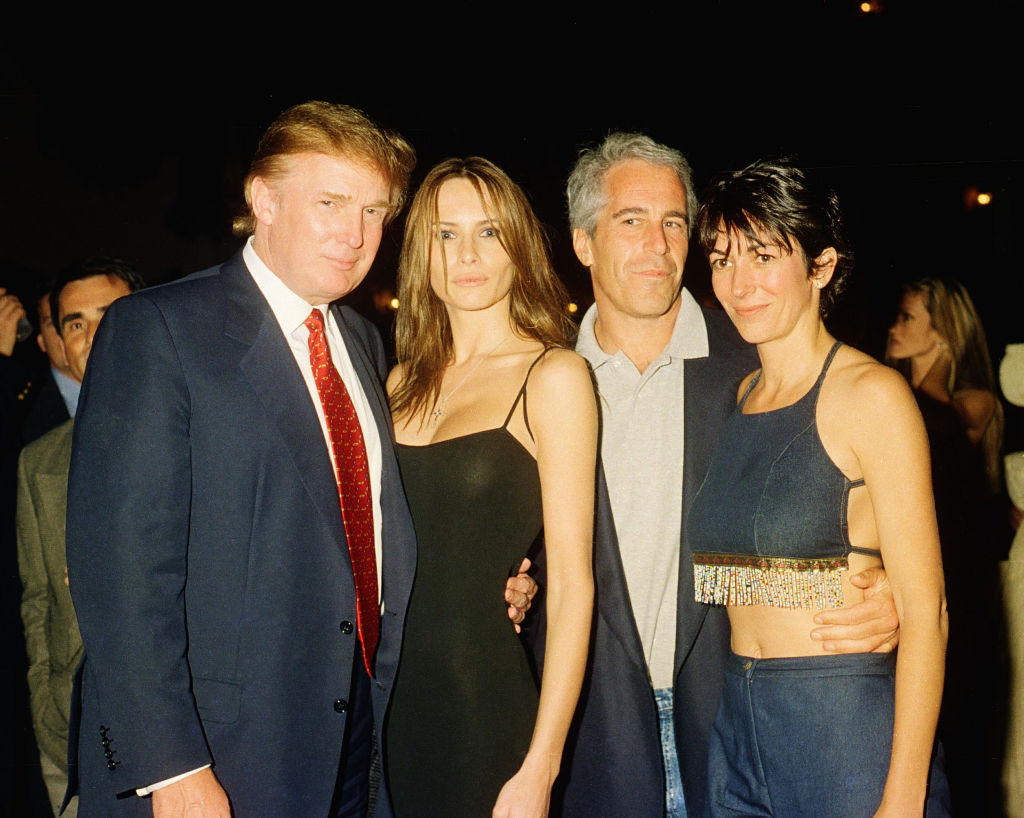DOJ
Source: Spencer Platt / Getty
Efforts by President Donald Trump to use the judicial system against his perceived enemies took a serious hit, as a federal judge dismissed separate cases against former FBI Director James Comey and New York Attorney General Letitia James. United States District Court Judge Cameron McGowan Currie made the ruling on Monday (Nov. 24), citing that Lindsey Halligan, the interim prosecutor in the Eastern District of Virginia, was “unlawfully appointed.”
In her ruling, Judge Currie wrote that it was improper for the Trump administration to appoint two interim prosecutors in a row, relying ironically on a previous decision by District Court Judge Aileen Cannon to dismiss an indictment against Trump due to the appointment of Jack Smith as a special counsel.
Halligan, a former White House aide, was named interim prosecutor to replace Erik Siebert. Siebert vocalized that there wasn’t sufficient evidence to indict both Comey and James. Upon taking over in late September, Halligan rushed to indict both figures, despite having no background as a prosecutor.
Judge Currie only ruled on the procedural issues, leaving it open for another prosecutor to pursue. But she noted the effect it would have on the criminal justice system. “It would mean the government could send any private citizen off the street — attorney or not — into the grand jury room to secure an indictment so long as the attorney general gives her approval after the fact,” she wrote. “That cannot be the law.”The ruling makes it the fourth instance that an appointment of a loyalist by the Justice Department has been declared unlawful, according to the New York Times. This includes the installation of Alina Habba as interim head of the U.S. attorney’s office in New Jersey. Attorney General Pam Bondi responded, stating that the Justice Department planned to pursue “all available legal action, including an immediate appeal.”
Source: Christina House / Getty
Ryan Wedding, perhaps taking inspiration from his former sport far too literally, finds himself in the crosshairs of the Justice Department, who claim that the former Olympic snowboarding athlete is a cocaine trafficker. According to the charges brought and pursued by the FBI, Ryan Wedding is reportedly connected to the dangerous Sinaloa cartel.
As seen in a press release from the DOJ’s Office of Public Affairs, 10 individuals connected to Ryan Wedding, a Canadian citizen now living in Mexico, were arrested and bringing the total to 11 people in custody.
From the DOJ:
Ryan James Wedding, 44, a Canadian national residing in Mexico, the case’s lead defendant, is charged with overseeing the operations of a criminal enterprise – including by engaging in witness intimidation tactics such as murder – and enriching himself with the enterprise’s laundered drug proceeds. In March 2025, Wedding was placed on the FBI’s List of Ten Most Wanted Fugitives. There is an increased $15 million reward for information leading to his arrest and/or prosecution.
Love Hip-Hop Wired? Get more! Join the Hip-Hop Wired Newsletter
We care about your data. See our privacy policy.
Attorney General Pam Bondi offered a statement, framing Wedding as a dangerous fugitive connected to the violent Mexican cartel. The FBI’s “Operation Giant Slalom” is the impetus for the arrests and manhunt for Wedding.
“Whether you’re a kingpin or a dealer on the street, anyone who sells drugs to our kids will be arrested and prosecuted,” Bondi said. “Ryan Wedding controls one of the most prolific and violent drug trafficking organizations in this world and works closely with the Sinaloa Cartel. We will not rest until his name is taken off the FBI’s Top 10 Most Wanted List, and his narco-trafficking organization lies dismantled.”
Wedding is accused of ordering the murder of a witness set to testify against him for a federal drug trafficking case in Colombia.
Ryan Wedding is still on the run and is currently on the FBI’s most wanted list.
—
Photo: Getty
Source: Samuel Corum / Getty
A federal judge overseeing the Justice Department’s case against former FBI Director James Comey called out the largest DOJ for a “disturbing pattern of profound investigative missteps” in the process of securing an indictment.
According to the Associated Press, Magistrate Judge William Fitzpatrick noted that the DOJ didn’t even provide defense lawyers with all the grand jury materials from the case.
“Those problems, wrote Judge Fitzpatrick, include ‘fundamental misstatements of the law’ by a prosecutor to the grand jury that indicted Comey in September, the use of potentially privileged communications during the investigation and unexplained irregularities in the transcript of the grand jury proceedings,” AP reports.
Love Hip-Hop Wired? Get more! Join the Hip-Hop Wired Newsletter
We care about your data. See our privacy policy.
“The Court recognizes that the relief sought by the defense is rarely granted,” Fitzpatrick wrote. “However, the record points to a disturbing pattern of profound investigative missteps, missteps that led an FBI agent and a prosecutor to potentially undermine the integrity of the grand jury proceeding.”
Judge Fitzpatrick’s 24-page opinion is a literal smackdown to the Justice Department’s actions leading up to the Comey indictment. The opinion points to how the DOJ’s rush to indict lead to procedural missteps, which gives the appearance that the independent arm of the law is working lockstep with President Donald Trump for “reasons separate and apart from the substance of the disputed allegations against Comey,” AP notes.
The Comey case and a separate prosecution of New York Attorney General Letitia James shows that the Justice Department is being weaponized to attack Trump’s political opponents. Both Comey and James filed several motions to dismiss these cases before the trials even began, claiming that the vindictive nature of the cases and the prosecutor who filed them, Lindsey Halligan, wasn’t even appointed properly.
Halligan apparently had no prior prosecutorial experience before being appointed as the interim U.S. attorney. Critics argue that making her the sole prosecutor for such high-stakes cases raises serious questions about competence and legitimacy and who may be pulling the strings behind the scene.
A different judge is expected to decide whether Halligan’s appointment can be challenged.
Trending on Billboard
Attorneys for Live Nation and Ticketmaster are hoping to end the Department of Justice’s sweeping antitrust case before it goes to trial, filing a 51-page summary-judgment motion that argues the claims of the DOJ and the 41 state AGs who joined the suit have failed to prove that the concert giant operates like a monopoly.
The filing, submitted to Federal Judge Arun Subramanian in the Southern District of New York, casts the government’s lawsuit as an overreach that collapses due to a lack of evidence.
Related
Live Nation’s attorneys at Latham Watkins and Cravath, Swaine & Moore allege that the DOJ began the litigation with harsh accusations against Live Nation, saying the DOJ accused the global promoter of operating “multiple, self-reinforcing monopolies” replete with “‘systematic’ and ‘intentional’ corruption of competition across ‘virtually every aspect of the live music ecosystem.’”
“Strong words,” Live Nation lawyers write. “If there was a lick of truth to them, one would expect Plaintiffs to now have mountains of evidence… And yet… Plaintiffs have barely a molehill.”
Live Nation’s attorneys go on to argue that the government has not proven the most fundamental element of a monopolization claim: monopoly power. Citing long-standing Supreme Court precedent, the company notes that “monopoly power is the foundational element of every monopoly maintenance case,” and insists the DOJ has failed to meet that threshold.
Instead of using traditional evidence of monopoly power to make its case – like high prices or significant barriers to entry — Live Nation says the DOJ case is built on inferences and derivative legal arguments, relying on “gerrymandered” market definitions to make its case. According to the motion, the government relies on a convoluted formula to define a “major concert venue,” singling out venues with capacities above 8,000 that host 10 or more concerts during at least one year in the 2017–2024 period. Stadiums, large theaters, smaller amphitheaters and many other common concert venues are excluded.
Related
Live Nation argues this structure ignores how competition in the concert business actually works, noting that “made-for-litigation markets plainly do not encompass ‘the area of effective competition’ that the law requires,” pointing out that rival ticketing companies such as SeatGeek, AXS, Eventim and Paciolan compete broadly and do not restrict their efforts to the DOJ’s handpicked venues.
Company attorneys argue that the DOJ’s narrowed market definition is the only way the government can claim Ticketmaster has a monopoly. According to Live Nation, the DOJ’s own expert calculated that Ticketmaster’s market share would fall from 86% to 49% if stadiums — venues the DOJ included when it challenged the Live Nation–Ticketmaster merger in 2010 — were defined as “major concert venues.”
“Far from having the ‘power to exclude competition,’ Ticketmaster has lost over 30 points of market share since the merger,” in 2011 between Live Nation and Ticketmaster, the company’s attorneys claim.
Beyond market definition, the company spends considerable space pushing back on one of the DOJ’s central theories: that Ticketmaster’s long-term exclusive ticketing contracts with venues hamper competition. Live Nation argues that exclusivity has been the industry standard in North America for decades and remains preferred by venues because it leads to higher up-front payments, smoother operations, integrated technology, and reduced consumer confusion about where to buy tickets.
“Every venue witness has testified that they seek and prefer exclusive ticketing contracts,” the memo reads, arguing that no venue manager interviewed in the lawsuit claimed to be coerced into an exclusive contract or pushed for a multi-ticketer system and was prevented from pursuing one.
Related
The DOJ has also accused Live Nation of tying concert promotion to its Ticketmaster’s offering, alleging that the company threatens or retaliates against venues by steering Live Nation-promoted tours away from buildings that choose rival ticketing services. Live Nation’s lawyers said evidence behind these allegations was paper thin, writing, “At most three venue witnesses support this claim—one in the last five years. … Three out of thousands could not possibly prove the market-wide anticompetitive effects required for a monopolization claim.”
According to the filing, the rest of the government’s evidence comes from rival ticketing companies — statements Live Nation calls inadmissible hearsay that cannot survive summary judgment. The company further notes that similar allegations were investigated by the DOJ in 2019, leading to a modification of the consent decree but not a finding of systemic misconduct. Since then, Live Nation says, “the outside antitrust monitor… has not reported a single violation.”
The company also disputes the government’s claims tied to Live Nation’s amphitheaters. Prosecutors allege that Live Nation illegally ties access to amphitheaters to its own promotion services, discouraging artists from working with independent promoters. Live Nation responds that this theory is contradicted by how touring actually works: artists, it says, control routing decisions, approve venues, set ticket prices, and choose their promoters based on guarantees and deal terms. The filing points out that the DOJ deposed only one artist throughout the entire case and that his testimony did not support the government’s claim. According to the motion, the artist “answered, without ambiguity or qualification,” that he had not been coerced to hire Live Nation as a condition of playing an amphitheater. “That is no basis for a trial,” the filing states.
Live Nation insists its amphitheaters are a competitive asset and not a leverage point to suppress competition. The company analogizes amphitheaters to tools of the trade: promoters, not artists, rent the venues, and the ability to offer those venues is part of how promoters compete for tours. The motion argues that amphitheaters typically are not rented to competing promoters for structural business reasons, not because of an anticompetitive scheme.
Related
Throughout the filing, Live Nation repeatedly invokes the DOJ’s own prior statements from 2010 in which the agency acknowledged the benefits of the company’s vertical integration with Ticketmaster. In approving the Live Nation–Ticketmaster merger, the DOJ wrote that “vertical integration can produce procompetitive benefits” and that “most instances of vertical integration… are economically beneficial.”
Live Nation attorneys also argue regularly in their memo that the DOJ cannot show harm to consumers—not through higher prices, a drop in shows or a decline in concert quality. Citing Microsoft and other precedent, Live Nation argues that such evidence is indispensable in a monopolization case. The filing states, “There must be evidence of actual harm to consumers; ‘harm to one or more competitors will not suffice.’ Plaintiffs never show that anything Defendants have done harmed artists or venues.”
The motion concludes by arguing that after extensive discovery, there are no triable issues remaining to be adjudicated. “The faithful application of law to the evidence adduced should yield summary judgment for Live Nation and Ticketmaster,” the filing states.
Attorneys for the government will have their chance to file a response in the coming weeks before Judge Subramanian determines whether the case proceeds to trial. If the summary-judgment motion is granted, much or all of the government’s case could be dismissed outright or the government could be forced to refile parts of its lawsuit.
Live Nation is also facing a lawsuit by the Federal Trade Commission over how the company operates its secondary ticket business.
Source: Davidoff Studios Photography / Getty
As the nation undergoes its longest government shutdown ever, Republicans are dealing with an additional explosive situation with unreleased documents related to disgraced financier Jeffrey Epstein. According to a former reporter, some GOP members of the House of Representatives have heard from contacts in the Department of Justice and the FBI that those files might be more harmful to President Donald Trump if released.
In a post on X, formerly Twitter, former Fox News and MSNBC reporter David Shuster stated that “A few GOP house members say they’ve heard from FBI/DOJ contacts that the Epstein files (with copies in different agencies) are worse than Michael Wolff’s description of Epstein photos showingTrump with half naked teenage girls.” He went on to write that the revelation has led to wide speculation throughout the Republican caucus.
Shuster referenced an interview that Wolff had with The Daily Beast last month, where the biographer claimed that in a visit with Epstein, he had pulled “about a dozen Polaroid snapshots” out a safe showing him and Trump together. In those photos, Trump posed with several topless young women on his lap. Wolff stated that Epstein, who died while awaiting a federal trial in 2019, had wanted Wolff to write a book about his life and invited the author to his home.
In a followup post, Shuster detailed that Attorney General Pam Bondi’s refusal to answer a question under oath while before the Senate Judiciary Committee “spooked” some Republicans. Democratic Senator Sheldon Whitehouse of Rhode Island asked Bondi if she had seen the photos from Epstein’s safe that Wolff had mentioned. Instead of answering, she countered by asking Whitehouse about receiving donations from an Epstein associate, LinkedIn co-founder Reid Hoffman.
The fears are magnified by the fact that there are now over 100 Republicans in the House of Representatives who are reportedly willing to vote for a bipartisan discharge petition led by Representatives. Ro Khanna of California and Thomas Massie of Kentucky. The petition needs only one more vote to bring it to the necessary 218 that would bring it to a floor vote to release all the files. Representative-elect Adelita Grijalva of Arizona, a Democrat, has committed to be that vote but she has not been sworn in by House Majority Leader Mike Johnson.
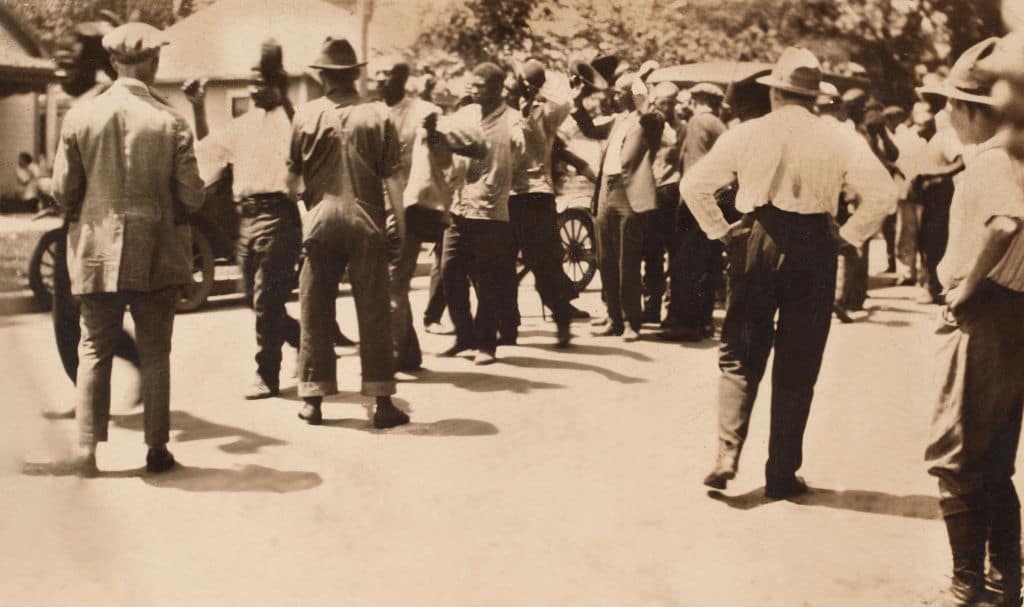
HipHopWired Featured Video
Source: Universal History Archive / Getty
Last September, the U.S. Department of Justice announced it would conduct its first federal review of the 1921 Tulsa Race Massacre. On Friday, the DOJ released the findings from its review — only about a century and three and a half years late.
As the Guardian noted, a June 1921 report on the race massacre by the Justice Department’s Bureau of Investigation, which preceded the FBI, blamed the attack that killed hundreds and leveled an entire affluent Black neighborhood on Black men and, alleging that the white perpetrators of one of the most notorious white supremacist attacks in American history did not violate any federal laws. (And people say objective journalism is dead. When was there ever objective journalism? Certainly not when white men were the only demographic allowed in the field.) The DOJ’s report, however, acknowledged who the true villains were during the massacre, and that the vicious attack on Black residents by the white mob “was so systematic and coordinated that it transcended mere mob violence.”
“The Tulsa race massacre stands out as a civil rights crime unique in its magnitude, barbarity, racist hostility and its utter annihilation of a thriving Black community,” Kristen Clarke, the assistant attorney general of the DOJ’s civil rights division, said in a statement. “In 1921, white Tulsans murdered hundreds of residents of Greenwood, burned their homes and churches, looted their belongings, and locked the survivors in internment camps.”
“Until this day, the justice department has not spoken publicly about this race massacre or officially accounted for the horrific events that transpired in Tulsa,” the 126-page report was conducted by a team of lawyers and investigators from the Emmett Till Cold Case Unit of the Criminal Section of the Civil Rights Division went on to say. “This report breaks that silence by rigorous examination and a full accounting of one of the darkest episodes of our nation’s past. This report lays bare new information and shows that the massacre was the result not of uncontrolled mob violence, but of a coordinated, military-style attack on Greenwood.”
Investigators for the review “spoke with survivors and with descendants of survivors, examined firsthand accounts of the massacre given by individuals who are now deceased, studied primary source materials, spoke to scholars of the massacre and reviewed legal pleadings, books, and scholarly articles relating to the massacre,” the report says. And yet, the living survivors of Tulsa and their descendants have repeatedly been denied reparations for all that they suffered and lost by the state of Oklahoma. They wanted long-overdue restitution, and all they got was a lousy review of what we already knew about the event.
Clarke noted in the review that “there is no living perpetrator for the justice department to prosecute.” So, basically, no reparations, no justice, only a century-late document confirming that what happened actually happened.
But that’s America for ya.
Live Nation’s top two in-house attorneys will not be allowed to access “highly confidential” documents produced by competitors like AEG Presents and SeatGeek in the antitrust lawsuit filed against the touring giant by the Department of Justice, though it will be granted access to less sensitive “confidential” documents under strict conditions limiting how the information is used and shared, according to a protective court order signed Monday (July 29) in the Southern District of New York.
A federal judge overseeing the case agreed to establish the two-tiered system for dealing with non-public documents the DOJ subpoenaed from Live Nation competitors as part of its ongoing investigation. For the last six weeks, DOJ antitrust lead trial counsel Bonny Sweeney has been in talks with Live Nation, which is accused of operating its ticketing and concert promotion businesses as a monopoly, about restricting access for the company’s in-house lawyers — executive vp of corporate and regulatory affairs Dan Wall and senior vp of litigation Kimberly Tobias — to confidential information handed over by competitors. Attorneys for Live Nation have argued that granting Wall and Tobias access to confidential information is vital in helping the company prepare its defense.
“Mr. Wall and Ms. Tobias are litigation counsel in good standing and officers of the court,” Live Nation outside counsel Alfred C. Pfeiffer wrote in a letter to New York federal judge Arun Subramanian. “Both have been bound by numerous protective orders and never been accused of violating those orders. Their access to confidential information in no way puts such information at risk.”
Trending on Billboard
Government lawyers counter that even if Wall and Tobias “pledge not to use any information they receive other than for this case, they can’t unsee what they have seen,” Subramanian wrote in a July 23 court order trying to resolve the confidentiality access question. Two days after that, attorneys for SeatGeek, AEG and ASM Global filed letters asking Subramanian to prevent Wall and Tobias from viewing any sensitive documents produced by the companies.
The files SeatGeek produced for the government “include documents that a company would never want to fall into the hands of any competitor,” SeatGeek attorney William Kalema wrote to the court.
“SeatGeek hears on at least a weekly basis from venues that are reluctant even to meet with SeatGeek for fear of retaliation from Defendants,” the letter continued. “If the market were to learn that venues’ contracts and other communications with Ticketmaster’s competitors were made available to Defendants’ senior management, SeatGeek’s ability to market its product would be hindered even further.”
Attorneys for AEG said they had produced “hundreds of thousands of documents” for the DOJ, including the company’s “most sensitive and competitively significant materials.” AEG attorney Justin Bernick took particular issue with Wall over past statements Wall has made in the media and on Live Nation’s blog, arguing that Wall has often acted as the company’s spokesperson rather than its lawyer.
After a brief hearing, Subramanian ruled that Wall and Tobias would not be allowed to view documents marked as highly confidential — meaning those involving trade secrets, customer lists, current or future financial and strategic information, private contract terms, personnel files, planning documents, and anything deemed sensitive by the courts — and that those documents can only be viewed by Live Nation’s outside attorneys. Wall and Tobias can, however, view confidential information — defined as previously non-public financial information, material related to ownership of non-public companies, business plans and marketing campaign documents related to product development.
In order to view confidential court files, Wall and Tobias must agree not to participate or advise Live Nation on “competitive decision-making” or litigation against AEG or SeatGeek — except for litigation tied to the DOJ lawsuit — for two years after the final confidential documents are reviewed.
The “highly confidential” and “confidential” designations will be determined by those producing the documents, Subramanian wrote in the earlier July 23 opinion, noting that “if it turns out that vast swaths of the record are improperly designated highly confidential, the Court will step in” and require “a page-by-page review of documents by the producing party on a tight timeframe or appropriate modifications to the protective order.”
Billboard has reached out to Live Nation for comment on this story. The trial for USA v. Live Nation Entertainment is scheduled to begin March 2, 2026.
Attorneys for Live Nation want the judge presiding over the company’s historic antitrust case to dismiss the Department of Justice’s allegations that the concert promoter uses illegal tying arrangements to operate its amphitheaters, arguing it has no obligation to allow rival promoters to use the venues it owns or manages.
Live Nation’s co-lead trial counsel Alfred C. Pfeiffer of Latham Watkins argued in a July 17 letter to Judge Arun Subramanian that this practice, described as a “refusal to deal,” is common in the concert business and protected by Supreme Court precedent.
“As a general matter, the Sherman Act does not restrict the long recognized right of a [defendant] engaged in an entirely private business, freely to exercise his own independent discretion as to parties with whom he will deal,” Pfeiffer writes, quoting a 2004 ruling in a case brought by Verizon.
Trending on Billboard
Accordingly, Live Nation has no obligation “to extend a helping hand to new entrants” or help its rivals “survive or expand,” Pfeiffer notes, adding, “the unimpeachable freedom to refuse to deal with rivals (in all but the rarest circumstances, which are not even arguably present in this case) rests on bedrock antitrust principles.”
In the government’s 128-page complaint against Live Nation, attorneys with the DOJ’s antitrust division allege that Live Nation illegally “conditions artists’ access” to the 56 outdoor amphitheaters the company controls by forcing artists to chose “Live Nation as the promoter for concerts at its venues.”
Pfeiffer’s letter was born out of a June 27 pre-trial hearing in which Judge Subramanian invited Live Nation’s attorneys to file a letter to the court identifying issues that Live Nation had with the DOJ complaint “as opposed to advancing those arguments after” an amended complaint is filed,” Pfeiffer wrote. “Your Honor advised that doing so would provide Defendants ‘a good argument that those claims should be dismissed with prejudice’” if the government cannot overcome Live Nation’s arguments on a motion to dismiss.
Live Nation lawyers also want the antitrust claims filed by 30 states’ attorneys general alongside the DOJ dismissed, including 22 separate claims under their own state laws.
“These claims are threadbare and conclusory” Pfeiffer writes, noting that many of the state AGs merely repeat the DOJ’s allegations without specifically alleging “the elements of each state-law claim” or citing “what conduct allegedly violates the state laws in question.”
Pfeiffer also criticized the states for failing to detail their damage claims and argued that many of the state objections were barred by different state’s statute of limitations.
The DOJ has until Sept. 18 to respond to Live Nation’s letter.
HipHopWired Featured Video
The Justice Department and several states are joining together to sue Live Nation Entertainment in connection to Ticketmaster, whose side accuses the company of owning a monopoly on live entertainment. Justice Department officials are accusing Ticketmaster of blocking out potential opportunities for other companies by striking exclusive ticket and venue deals that essentially gave them the lion’s share of the market.
The New York Times reports that based on the accounts of unnamed invidious close to the matter, the federal government, along with a grouping of states that were not announced in the outlet’s report. The position that will be taken when the matter goes to court is the accusation that Live Nation struck exclusive ticketing contracts with certain concert venues and served as the main ticket hub for concert tours.
Further, the government will claim that other business factors such as venue management according to insiders, aided Live Nation in becoming a monopoly by passing on high costs to consumers and causing damage to any competitors’ efforts to enter the field. Further, the DOJ will state within the lawsuit that tours that were promoted by the entertainment company were more likely to play shows where Ticketmaster had exclusive rights to ticket sales.
Ticketmaster reportedly sells about 600 million tickets annually according to global tallies. It is estimated that the company’s ticketing business is responsible for between 70 and 80 percent of major concert venues domestically.
In 2023, a congressional hearing was held that was sparked by a frenzied Taylor Swift tour presale event which millions of fans were unable to participate in. Both Republicans and Democrats in the U.S. Senate called the company a monopoly
The lawsuit will be filed in the Southern District of New York.
—
Photo: Getty
The U.S. Department of Justice is planning to sue Live Nation over alleged violations of federal antitrust laws, according to a report by the Wall Street Journal.
A lawsuit will be filed within weeks that alleges the concert giant leveraged its dominance over the live music industry to undermine competition for ticketing, the Journal reported Tuesday, citing people familiar with the matter. Few other details about the planned case were revealed.
Live Nation has faced widespread criticism from angry fans and lawmakers since its botched handling of Taylor Swift’s “Eras” tour in 2022. Days after the incident, news broke that the DOJ had already been investigating Live Nation for months over potential antitrust violations.
Trending on Billboard
Representatives for Live Nation and the DOJ did not immediately return requests for comment from Billboard.
Since Live Nation and Ticketmaster merged in 2010, the company has long faced criticism that it exerts an unfair dominance over the market for live concerts. The DOJ approved the merger at the time, but imposed a so-called consent decree designed to prevent the company from abusing its position. Those restrictions were set to expire in 2020, but they were extended by five years after the DOJ accused Live Nation of repeatedly violating the decree.
That same criticism resurfaced in late 2022 with the disastrous roll out of tickets to Swift’s tour, which saw widespread service delays and website crashes as millions of fans tried – and many failed – to buy tickets. Live Nation pinned the blame on a “staggering number of bot attacks,” but lawmakers quickly argued that the incident was the result of a market dominated by one company.
“Ticketmaster’s power in the primary ticket market insulates it from the competitive pressures that typically push companies to innovate and improve their services,” said Sen. Amy Klobuchar (D-Minn.), the chair of the Senate subcommittee for antitrust issues.
In December 2022, the New York Times reported that DOJ had already been investigating Live Nation for months before the Swift debacle, including reaching out to venues across the country to ask about the company’s conduct. A year later, Reuters reported that the probe was ongoing, with federal investigators focusing on whether Live Nation imposed anticompetitive agreements on venues.
Last year, Live Nation hired Dan Wall, a veteran competition attorney who previously headed the antitrust practice at the law firm Latham & Watkins, as an executive vice president for corporate and regulatory affairs. In a blog post last month, Wall publicly defended the company against allegations similar to those that could be coming in the DOJ’s lawsuit, arguing that ticket prices were set by artists and driven up by the forces of supply and demand.
“In the ongoing antitrust attacks on Live Nation and Ticketmaster, a constant theme is that their alleged ‘monopolies’ are responsible for high ticket prices,” Wall wrote. “Rhetorically, that’s understandable, because if you want to rile up fans against Live Nation and Ticketmaster, there is no better way than to blame them for something you know fans dislike.”
-
Pages

 State Champ Radio
State Champ Radio 